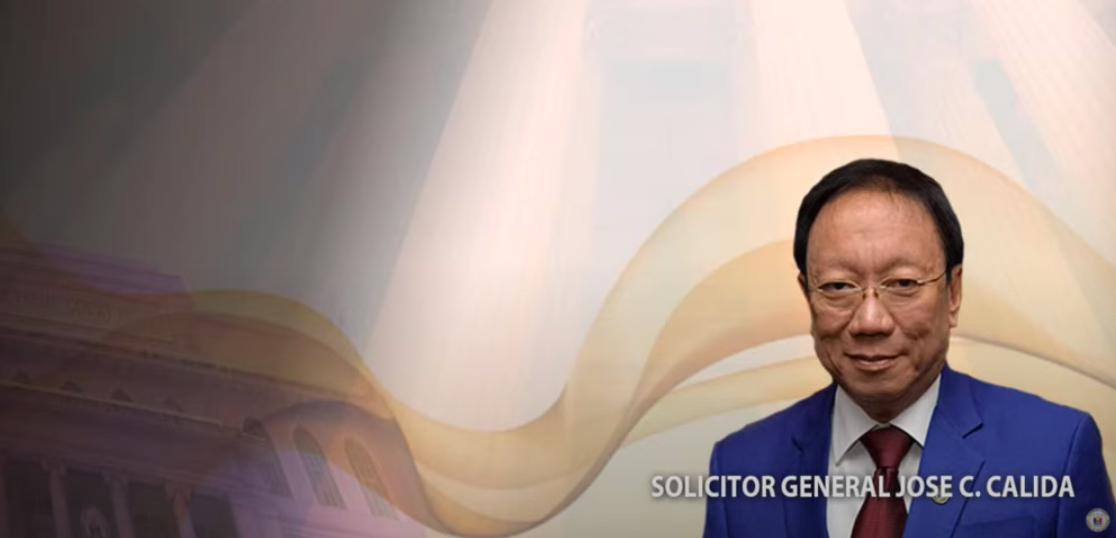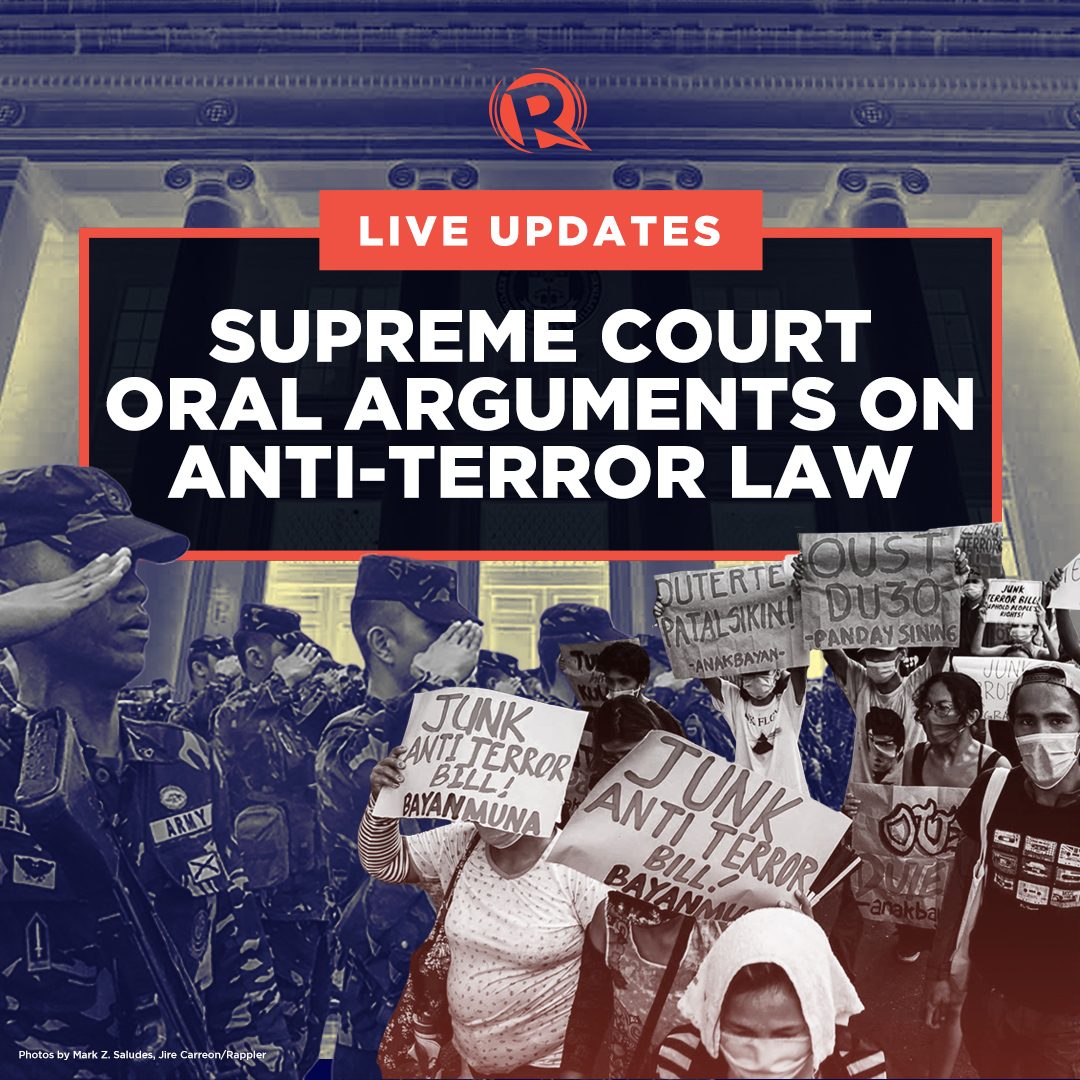WHAT YOU NEED TO KNOW
The Supreme Court finally hears the petitions against the anti-terror law, the pet law of President Rodrigo Duterte that is seen to further endanger human rights in the Philippines.
The petitioners, represented by top legal minds of the country, will face off against Solicitor General Jose Calida, who has consistently used unconventional maneuvers to win cases before the High Court.
The debate will focus on the purpose of the anti-terror law and how it possibly violates the Constitution and other existing laws.
Bookmark and refresh this page for updates and analyses.
LATEST UPDATES
OSG: Government is not red-tagging but truth-tagging
Assistant Solicitor General Marissa dela Cruz-Galandines echoed the line of the mouthpieces of the National Task Force to End Local Communist Armed Conflict (NTF-ELCAC).
Galandines said on Tuesday, May 4, that “what the government does is not red-tagging but truth-tagging.”
Justice Ricardo Rosario brought up a journalist’s controversial question to community pantry organizer Ana Patricia Non if she had links to communists. Ricardo asked if such incident proves the petitioners’ claim that there will be red-tagging.
Galandines said red-tagging “is a term coined not by the government but by leftists.”
Red-tagging is actually a term used by the United Nations, the Supreme Court, and now by Senator Franklin Drilon in his bill seeking to criminalize red-tagging.
Jhosep Lopez zeroes in on contentious provisions
To start off Day 6 of the anti-terror law oral arguments on Tuesday, May 4, junior Justice Jhosep Lopez zeroed in on the most contentious provisions of the law, going as far as asking whether there was a need at all to include that clause.
For the 24-day detention clause under Section 29, Lopez asked if the 1987 Constitution should be changed because the charter provides only for a maximum of three days, and that’s even under a state of martial law.
On the designation clause under Section 25, Lopez asked why there’s a need for designation when the government could go straight to the court for proscription “where there’s due process.” Lopez asked Galandines if she agreed that designation need not be included in the law.
The Department of Justice provided for under the internal rules a process for delisting, but Lopez pointed out that delisting is not in the law itself.
“Can you implement something that’s not in the law?”
Assistant Solicitor General Marissa dela Cruz-Galandines took the questions, as Solicitor General Jose Calida still chooses to stay in the sidelines as of writing.
Supreme Court asks Esperon to explain red-tagging of community pantries
The Supreme Court will ask National Security Adviser Hermogenes Esperon Jr to explain why some government officials have linked organizers of community pantries to the New Peoples’ Army (NPA), when it resumes oral arguments on the anti-terror law petitions on May 4.
Esperon would have been asked to respond to the questions of Associate Justice Rosmari Carandang to Assistant Solicitor General Raymund Rigodon during Day 5 of the anti-terror law oral arguments on Tuesday, April 27, but there was no more time.
Read more.
Calida’s assistants grilled
After delivering an hour-long opening statement, Solicitor General Jose Calida ceded the (Zoom) microphone to his assistant solicitors general (ASGs). ASG Raymund Rigodon and ASG Marissa dela Cruz-Galandines took the questions from the justices instead of Calida.
Both Rigodon and Galandines were grilled by the case lead, Associate Justice Rosmari Carandang.
In her interpellation of Galandines, Carandang asked about the anti-terror council’s powers to authorize warrantless arrest and detentions. When Galandines said that warrantless arrests complied with regular rules, Carandang said, “That’s not what the law says.”
Both the ASGs fumbled on some questions. At the close of the day’s oral arguments, Calida did not step in for his assistants.
Read the full story here.
Calida red-tags Colmenares, progressives in Supreme Court

Solicitor General Jose Calida red-tagged progressive lawyer Neri Colmenares and other progressive groups during his opening statement to the Supreme Court in the anti-terror law oral arguments held online on Tuesday, April 27.
After a rundown of recent raids into offices and supposed “armories” of communist rebels, Calida mentioned that law enforcement also recovered paraphernalia of Colmenares, his party list Bayan Muna, and another party-list group Gabriela.
“Likewise discovered in the armory were subversive documents, streamers, campaign paraphernalia of Congressman Colmenares, Bayan Muna and Gabriela, and training materials on advanced revolutionary warfare,” said Calida.
Read the full story here.
Solicitor General Calida red-tags Colmenares, Bayan Muna, Gabriela
Calida red-tags Atty Neri Colmenares, Bayan Muna, and Gabriela before the Supreme Court. | via @lianbuan #ATAOrals LIVE: https://t.co/PODEEArx7Q
— Rappler (@rapplerdotcom) April 27, 2021
After mentioning raids on "CPP-NPA armories" and Abu Sayyaf attacks, Calida: Petitioners have never spoken out against recent atrocities…. If they have never taken a stand on these acts, and if silence is complicity, there can only be one inescapable conclusion. | @lianbuan
— Rappler (@rapplerdotcom) April 27, 2021
SolGen says anti-terror law brimming with safeguards
Calida: The anti-terror law is brimming with safeguards that will protect the people. The state cannot turn a blind eye on the practical realities of crushing terrorism. | via @lianbuan
— Rappler (@rapplerdotcom) April 27, 2021
READ: https://t.co/epvUbOWI07
